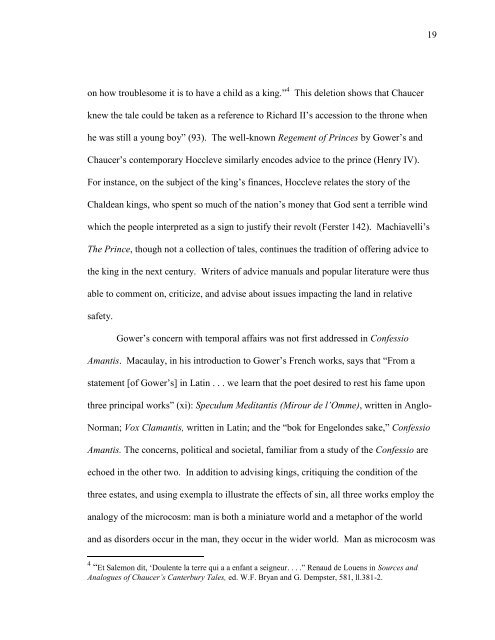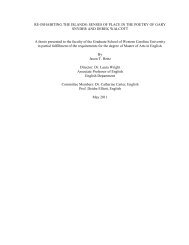SUMMERS, KAREN CRADY, Ph.D. Reading Incest - The University ...
SUMMERS, KAREN CRADY, Ph.D. Reading Incest - The University ...
SUMMERS, KAREN CRADY, Ph.D. Reading Incest - The University ...
Create successful ePaper yourself
Turn your PDF publications into a flip-book with our unique Google optimized e-Paper software.
19<br />
on how troublesome it is to have a child as a king.” 4<br />
This deletion shows that Chaucer<br />
knew the tale could be taken as a reference to Richard II’s accession to the throne when<br />
he was still a young boy” (93). <strong>The</strong> well-known Regement of Princes by Gower’s and<br />
Chaucer’s contemporary Hoccleve similarly encodes advice to the prince (Henry IV).<br />
For instance, on the subject of the king’s finances, Hoccleve relates the story of the<br />
Chaldean kings, who spent so much of the nation’s money that God sent a terrible wind<br />
which the people interpreted as a sign to justify their revolt (Ferster 142). Machiavelli’s<br />
<strong>The</strong> Prince, though not a collection of tales, continues the tradition of offering advice to<br />
the king in the next century. Writers of advice manuals and popular literature were thus<br />
able to comment on, criticize, and advise about issues impacting the land in relative<br />
safety.<br />
Gower’s concern with temporal affairs was not first addressed in Confessio<br />
Amantis. Macaulay, in his introduction to Gower’s French works, says that “From a<br />
statement [of Gower’s] in Latin . . . we learn that the poet desired to rest his fame upon<br />
three principal works” (xi): Speculum Meditantis (Mirour de l’Omme), written in Anglo-<br />
Norman; Vox Clamantis, written in Latin; and the “bok for Engelondes sake,” Confessio<br />
Amantis. <strong>The</strong> concerns, political and societal, familiar from a study of the Confessio are<br />
echoed in the other two. In addition to advising kings, critiquing the condition of the<br />
three estates, and using exempla to illustrate the effects of sin, all three works employ the<br />
analogy of the microcosm: man is both a miniature world and a metaphor of the world<br />
and as disorders occur in the man, they occur in the wider world. Man as microcosm was<br />
4 “Et Salemon dit, ‘Doulente la terre qui a a enfant a seigneur. . . .” Renaud de Louens in Sources and<br />
Analogues of Chaucer’s Canterbury Tales, ed. W.F. Bryan and G. Dempster, 581, ll.381-2.
















